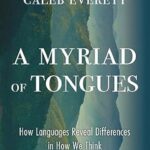Alter Ego by Alex Segura
Last summer I read the author’s Secret Identity, about women in the comics industry and the fictional Carmen Valdez, who created The Legendary Lynx for the minor-league comics company, Triumph Comics. She secretly teamed up with the artist to create the short-lived series, hiding her contributions from the editor and publisher. That was the 1980s.
In this sequel, three decades later, the protagonist is Annie Bustamante, a struggling filmmaker who grew up loving the Lynx. She’s given an opportunity to write and draw the reboot, but her artistic integrity runs afoul of the publishers’ attempts to cash in on the intellectual property. Questions arise about who owns the rights to the Lynx and before long Annie and her teenage daughter are trying to track down Carmen Valdez. It’s fast-paced, heart-warming story about grit and love for the comics medium, with plenty of inside comics lore and allusions.
A Myriad of Tongues: How Languages Reveal Differences in How We Think by Caleb Everett
I’d been wanting to read this for a while and it was worth the wait. It’s an erudite but accessible tour of language diversity and linguistic ideas. Part of the book’s point is that scholars have often dismissed some of the features of less studies languages in favor of the languages of Western, Educated, Industrial, Rich, Democracies (ironically dubbed WEIRD languages, to use anthropologist Joseph Henrich’s term). In doing so, linguistics missed much of the diversity of linguistic phenomena and of language itself. The writing is lively, with Everett introducing points through familiar situations. His discussions, draw from both his own work and recent studies by a variety of linguistics and anthropologists, show how the structure of language matches up with the structure of culture and in turn with factors such as geography, environment, and more. He is careful not to overreach with sweeping conclusions and thus readers come away with renewed excitement to explore some of the topics and sources further.
The other main takeaway, for me, was the way in which some ideas that had once seemed marginal are given new life by looking at diverse phenomena: the Sapir-Whorf hypothesis is one of course, but also the proposal of Charles Hockett connecting agricultural societies and a preference for labiodental sounds, as well as Zipf’s Law and its further elaboration by Steven Piantadosi and colleagues.
Among other things, Everett discussed the ways in which languages conceptualize time, space, and geography, the organization of kinship terms, color terms, and words for smells, evidentiality, sound symbolism, idioms and constructions as drivers of grammar, and the familiar topic of recursiveness.
A Myriad of Tongues will interest both linguists and general readers.
High Desert, Higher Costs: Bend and the Housing Crisis in the American West by Jonathan Bach.
This book, by a Portland Business Journal writer on the housing and real estate beat, is timely, well-researched, and evocative. Bach begins with a personal tale of his parent settling in Bend, Oregon, and finally buying the house of their dreams. But it is a dream now denied to many. He draws on the stories of housing activists, political leaders, developers, and ordinary folks and to explore the political legal, cultural, and economic issues around housing in the central Oregon city of Bend. Bend was once a relatively underpopulated recreation paradise and has quickly transitions to typify the housing crisis of the West: it’s a story of stagnating wages, increasing prices, a housing market that is hostile to the working middle-class, and of vacation rental investors, corporate greed, and gentrification from “amenity workers.” It’s also the story of Oregon’s land use policy, NIMBY attitudes, , and the shortage of developable land. Bach’s work is important and not just for Oregon: Bend is not alone in this; it is among the many Zoom towns populating the West—places like Boise, Bozeman, and Boulder, so the narrative he describes is a cautionary tale that is important to attend to.

 Follow
Follow

